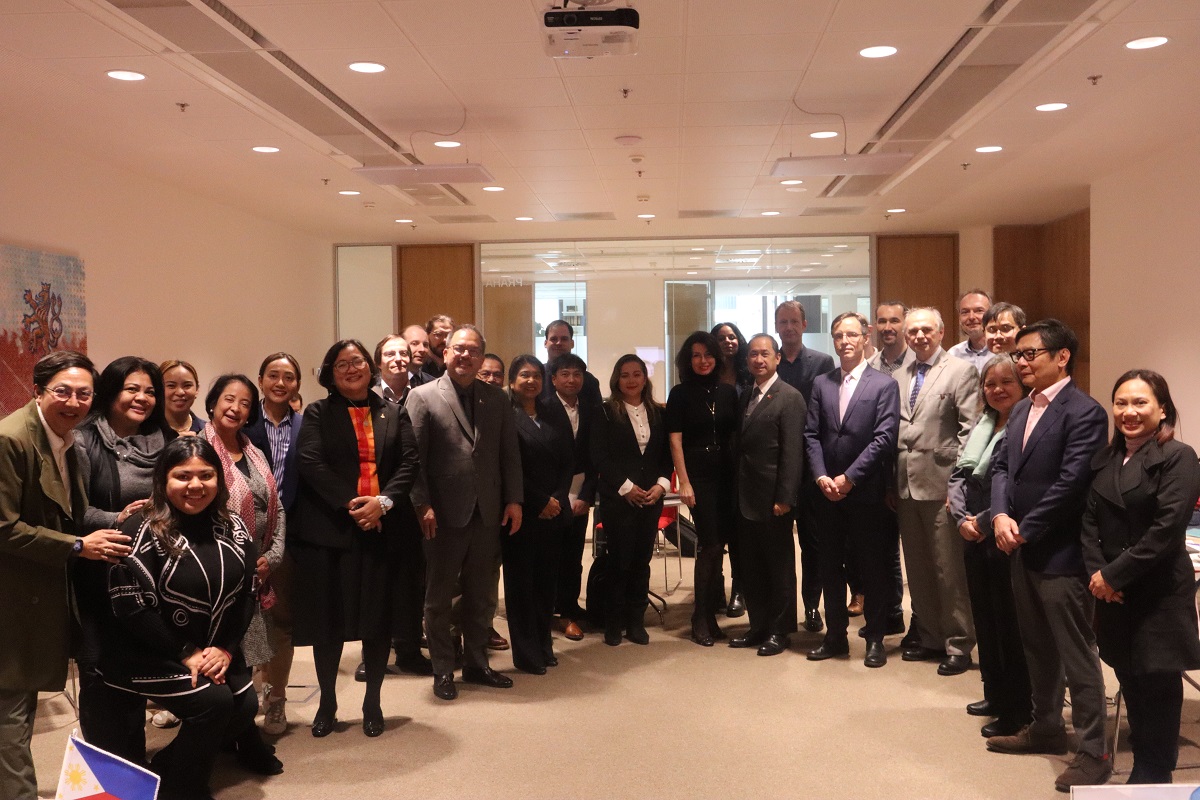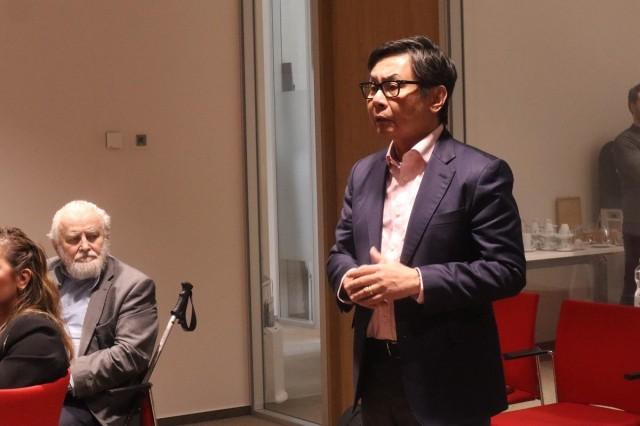PH woos Czech investors in agri-fishery, food businesses

PRAGUE — Philippine government officials and business representatives recently urged Czech investors to engage with and venture into various food and agricultural companies in the Philippines.
At a trade and investment forum at the Czech Chamber of Commerce in Prague on February 15, Department of Agriculture (DA) Undersecretary Jerome Oliveros asked potential investors to help Filipino farmers through business ventures.
“As you invest in our country, you would be able to achieve two things: the missions of helping in poverty alleviation [and] helping food security,” he said during the forum.
The Czech Republic is “the Philippines’ 39th trading partner, 28th export market, and 47th import supplier last year, with total bilateral trade amounting to USD 303.21 million,” Malacañang said in a report. Philippine Statistics Authority (PSA) data shows agricultural export revenue in the second quarter of 2023 went down from $2.13 billion to $1.61 billion, 24.4% lower than in the second quarter of 2022.
“[Based on] feedback from the Czech business community, we are convinced that there is a big potential in the further development of Czech-Philippine business cooperation,” Jana Havrdova, vice president of the Chamber of Commerce of the Czech Republic, said.
Trade, investment opportunities
DA officials presented to Czech firms the Philippine government’s overarching medium- and long-term development plans, including its “thrust in food security”. Atty. Genevieve E. Velicaria-Guevarra, who oversees the DA’s agribusiness and marketing promotion service, shared that the country’s agricultural export priorities are coffee, banana chips, dried pineapple, young coconut, fresh mango, ube powder, durian preparation, calamansi juice, turmeric powder, moringa products and pili nut. On the other hand, the non-food commodities are activated carbon, refined carrageenan, copra, and abaca fiber products.
Meanwhile, Engr. Anne Glyn F. Lisbo, head of DA’s agribusiness investment promotion division, said Czech firms could consider investment opportunities supporting the infrastructure and modernization of the agriculture, fisheries, and food and beverage industries.
Lisbo invited Czech investors to work together to increase the Philippines’ “agricultural productivity, lower the food cost, ensure food security, make farming and fisheries a bankable investment, [and] empower Philippine farmers and fisherfolk as reliable partners in agribusiness.”
Lisbo noted that coconut and Philippine cacao are among the key commodities with high export demands with varying investment areas. As for multi-commodity investment opportunities, Czech firms can invest in irrigation, feed milling, cold storage, product processing, fisheries and agro-industrial development facilities, mechanization services, food safety technologies, advanced testing operations for agri-fishery laboratories and testing centers, and ICT-driven infrastructures.
Mitigating the effects of climate change
Although the Philippines has experienced cool weather recently, the Philippine Atmospheric, Geophysical and Astronomical Services Administration (PAGASA) advises the country to brace for reduced rainfall due to El Niño, which may intensify dry spells and drought.
Philippine Honorary Consul General in Brno Bretislav Skacel, who is also managing a hydro and energy business in the Czech Republic, said they are closely cooperating with research institutes and other European associations to find some technologies to help with climate recovery.

“We are ready to discuss this to find proper technologies and ways to help [with] this,” Skacel said.
Velicaria-Guevarra from the DA said they are pushing for solar-powered irrigation systems that can be brought to the countryside and more remote areas.
“If you build an irrigation system, it entails a major infrastructure. That’s why we’re looking at more portable solutions to address this problem,” Velicaria-Guevarra added.
Philippine-Czech exchange
At the trade forum, Peter Sedlacek, who owns a mango importing business in the Czech Republic and collaborates with a Filipino business partner, raised his concern regarding foreign ownership of companies in the Philippines. He was referring to the 60-40 equity rule on business ownership under the Philippine Foreign Investment Law, which means at least 60% of the business must be owned by a Filipino citizen.
“We want to have organic mangoes. In the Czech Republic, the weather is very different. Organic food is very [limited] here. I’m happy that we can maybe bring organic mangoes to the Czech Republic,” Sedlacek shared.
Nicanor Bautista, commercial counselor for the Philippine Trade and Investment Center at the Philippine Embassy in Berlin, Germany, clarified that “in general, foreigners are allowed to open up 100% foreign equity in the Philippines.”

Responding to Sedlacek, Bautista said, “Except for a few items, like defense equipment and advertising … fruit processing trading … is allowed under our law to be 100% owned and registered in the Philippines.”
“You cannot buy land, but you can lease. Outside of land ownership, you can have the foreign company registered 100% under your Czech company,” Bautista added.
Opening the economy to foreign investments is one of the thrusts in the push for Charter change. However, retired Supreme Court Senior Associate Justice Antonio Carpio said existing laws already allow 100% foreign ownership.
Meanwhile, Crisjel Kuklovsky, a Filipino who owns a grocery store in Prague, said she expects Filipino-owned businesses in the Czech Republic to grow with the expected influx of Filipino workers from this year.
“Hindi masyadong alam ng mga Czech kung ano ang mga products natin. The thing is we [put out] more money [on advertising] and focus on promoting our store and products. We [target] foreign customers. Now, we have more Czech customers than Filipinos.” Kuklovsky said.
(Czechs still don’t know what our products are. The thing is we put out more money on advertising and focus on promoting our store and products. We target foreign customers. Now, we have more Czech customers than Filipinos.)
There are about 7,000 Filipinos in the Czech Republic, and that number is expected to double next year as the Czech government raised the annual quota of employee applications from the Philippines from 5,000 to 10,300.
Philippine Ambassador to the Czech Republic Eduardo Martin R. Meñez said more Filipinos are coming to the Czech Republic to contribute to the Czech economy, adding that “some of them are also in the agricultural sector.”
“The interest between our two countries in trade and investment is increasing along with the other areas of bilateral relations. And so, I sincerely believe that there are many areas of complementarity between our two economies,” Meñez said.
Marcos state visit
President Ferdinand "Bongbong" Marcos Jr. is slated to visit the Czech Republic in March, almost a year after Czech Prime Minister Petr Fiala’s visit to Manila.
The first leg of the President’s diplomatic tour in Europe starts with a working visit in Berlin, Germany to discuss economic and security issues, and regional developments.
“The level and frequency of high-level visits is really increasing. It was also mentioned that the Czech Minister of Agriculture will be visiting the Philippines soon after the president visits the Czech Republic. And, similarly, the joint economic council meeting is going to be held in Manila later this year,” Meñez said. —KBK, GMA Integrated News




